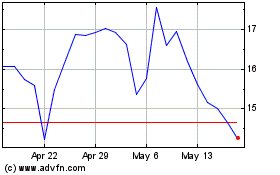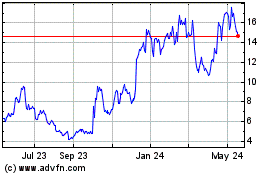ALX Oncology Reports Encouraging Clinical Data of Evorpacept in Combination with Standard-of-Care in an Ongoing Phase 1/2 Clinical Trial in Patients with Relapsed or Refractory B-cell Non-Hodgkin Lymphoma (“R/R B-NHL”)
April 09 2024 - 4:30PM

ALX Oncology Holdings Inc., (“ALX Oncology” or “the Company”)
(Nasdaq: ALXO), an immuno-oncology company developing therapies
that block the CD47 immune checkpoint pathway, today reported
encouraging clinical data from the ongoing Phase 1/2
investigator-sponsored trial (“IST”) of evorpacept in combination
with R2 in patients with indolent and aggressive R/R B-NHL. The new
data were presented in an oral presentation at the 2024 American
Association for Cancer Research (“AACR”) Annual Meeting.
The clinical trial enrolled a total of 20 patients with indolent
(n=18) and aggressive (n=2) R/R B-NHL where all patients had
received prior rituximab and 72% had received prior
chemoimmunotherapy. Patients received evorpacept 30 mg/kg Q2W (n=3)
or 60 mg/kg Q4W (n=17) in combination with standard R2 treatment.
The regimen was well tolerated, and there were no dose-limiting
toxicities. The maximum administered dose for evorpacept was 60
mg/kg Q4W. The most common adverse events due to any cause were
fatigue, ALT increase, anemia, and AST increase, all of which were
mostly low grade. There were no reported treatment-related deaths
on study. Patients with indolent R/R B-NHL (n=18) had a best ORR of
94% and a CRR of 83%. The median duration of response was not
reached. The AUGMENT Phase 3 clinical trial1, a benchmark study in
a similar patient population, reported an ORR of 78% and a CRR of
34% with R2 alone.
“While standard frontline treatments have shown benefit in the
indolent B-NHL setting, many patients are likely to see their
disease progress after initial treatment,” said Paolo Strati, M.D.,
the trial’s lead investigator and Assistant Professor of
Lymphoma-Myeloma at The University of Texas MD Anderson Cancer
Center. “We are pleased evorpacept in combination with R2
demonstrated a favorable safety profile and encouraging response in
this patient population. These data further illustrate the
importance of exploring novel combinations with evorpacept to
elicit anti-tumor activity by way of the innate immune response. We
are excited to build upon these preliminary results as we evaluate
the evorpacept-R2 combination in the ongoing Phase 2 portion of
this clinical trial in patients with previously untreated indolent
B-NHL.”
“These initial results reinforce evorpacept’s differentiated
drug design that has resulted in anti-cancer activity while
minimizing hematologic toxicities inherent to other CD47 blocking
agents,” said Sophia Randolph, M.D., Ph.D., Chief Medical Officer,
ALX Oncology. “Furthermore, the findings presented today build upon
the promising data reported from the ASPEN-01 Phase 1 clinical
trial of evorpacept in combination with rituximab in R/R NHL2. We
look forward to applying these and other clinical trial data to
inform new evorpacept combinations in our expanding pipeline. We
would like to thank the patients and research team for conducting
this important clinical trial.”
Details of the Oral Presentation at the 2024 AACR Annual
Meeting are as follows:
A Phase 1 investigator-initiated trial of evorpacept
(ALX148), lenalidomide and rituximab for patients with relapsed or
refractory B-cell non-Hodgkin lymphomaSession Title:
Clinical Trials Minisymposium / Novel Agents and Emerging
Therapeutic StrategiesPresentation Date and Time: Tuesday, April 9,
2024, 2:50 PM – 3:00 PM PTAbstract: CT037 (full abstract is
available online here)
The presentation is available on the publications page of the
ALX Oncology website here.
About the Phase 1/2 IST Investigating Evorpacept
Combination to R2 in NHL
The Phase 1/2 IST is an ongoing, open-label, single arm clinical
trial designed to evaluate the safety, tolerability, and efficacy
of evorpacept, otherwise known as ALX148, in combination with R2 in
patients with R/R B-cell NHL (both indolent and aggressive)
histology. Patient enrollment is currently open to the Phase 2
portion of the study evaluating patients with previously untreated
indolent B-NHL (NCT05025800). The study is sponsored and conducted
by MD Anderson Cancer Center.
About Non-Hodgkin Lymphoma
Approximately 500,000 people worldwide are diagnosed with NHL
each year. In the U.S., NHL is the seventh most common type of
cancer, and over 80,000 newly cases of NHL were estimated in 20233.
NHL can be divided into two groups according to how the disease
progresses: indolent and aggressive lymphomas. The most prevalent
form of NHL, accounting for about 32% of newly diagnosed NHL cases,
is an aggressive form called diffuse large B-cell lymphoma.
Follicular lymphoma is the most common subtype of indolent NHL and
accounts for about 17% of newly diagnosed NHL cases. Indolent
B-cell lymphomas tend to grow more slowly and may have fewer signs
and symptoms than aggressive lymphomas when first diagnosed. For
patients with indolent B-cell lymphoma, current first-line
treatments include radiotherapy, anti-CD20 monoclonal antibodies,
and chemoimmunotherapy. Despite advances in treatment, follicular
lymphoma remains a significant cause of death.
About ALX Oncology
ALX Oncology is a publicly traded, clinical-stage
immuno-oncology company focused on helping patients fight cancer by
developing therapies that block the CD47 immune checkpoint
inhibitor and bridge the innate and adaptive immune system. ALX
Oncology’s lead product candidate, evorpacept, is a next generation
CD47 blocking therapeutic that combines a high-affinity CD47
binding domain with an inactivated, proprietary Fc domain. To date,
evorpacept has been dosed in over 500 subjects and has demonstrated
promising activity and favorable tolerability profile across a
range of hematologic and solid malignancies in combination with
various leading anti-cancer antibodies. ALX Oncology is currently
focusing on combining evorpacept with anti-cancer antibodies,
antibody-drug conjugates (“ADCs”), and PD-1/PD-L1 immune checkpoint
inhibitors.
Evorpacept’s Unique Profile: Anchored by a Rational
Design and Dual Development Pillars
Rationally engineered with an inactive Fc effector function,
evorpacept’s clinical data to date has demonstrated a substantially
improved safety profile over other anti-CD47 molecules in the
clinic with an active Fc (i.e., binding the Fc gamma receptor on
macrophages). This best-in-class safety profile allows for higher
dosage with minimal overlapping toxicity in the combination
treatment setting. CD47 expressed on cancer cells binds to its
receptor SIRP alpha, which is predominantly expressed on two cell
types: macrophages and dendritic cells. The Company’s pipeline of
therapeutic candidates with standard-of-care agents include:
- Anti-cancer antibodies (the “don’t eat me”
signal): evorpacept enables Fc-mediated antibody-dependent
phagocytosis by macrophages in combination with anti-cancer
antibodies (e.g., Herceptin®) with an active Fc domain, which is
otherwise impaired by CD47 expression on cancer cells binding to
SIRP alpha on macrophages. This same mechanism of action applies to
ADCs.
- PD-1/PD-L1 immune checkpoint inhibitors (the “don’t
activate T-cells” signal): evorpacept enables T-cell
activation by dendritic cells that are constitutively inhibited by
CD47 expression on cancer cells binding to SIRP alpha on dendritic
cells. Activated dendritic cells present neoantigens to T-cells
that once activated will kill cancer cells when the PD-1/PD-L1
inhibitory interaction is blocked by T-cell checkpoint
inhibitors.
References
- 1 Leonard J.P., et al. AUGMENT: A Phase III Study of
Lenalidomide Plus Rituximab Versus Placebo Plus Rituximab in
Relapsed or Refractory Indolent Lymphoma. J Clin Oncol. 2019 May
10;37(14):1188-1199. doi: 10.1200/JCO.19.00010. Epub 2019 Mar 21.
PMID: 30897038; PMCID: PMC7035866.
- 2 Kim T., et al. ALX148, A CD47 Blocker, in Combination with
Rituximab in Patients with R/R Non-Hodgkin Lymphoma. EHA Library.
06/12/2020 293736; EP1247.
- 3 American Cancer Society. Cancer Facts & Figures
2024. Atlanta: American Cancer Society; 2024.
Cautionary Note Regarding Forward-Looking
Statements
This press release contains forward-looking statements that
involve substantial risks and uncertainties. Forward-looking
statements include statements regarding future results of
operations and financial position, business strategy, product
candidates, planned preclinical studies and clinical trials,
results of clinical trials, research and development costs,
regulatory approvals, timing and likelihood of success, plans and
objects of management for future operations, as well as statements
regarding industry trends. Such forward-looking statements are
based on ALX Oncology’s beliefs and assumptions and on information
currently available to it on the date of this press release.
Forward-looking statements may involve known and unknown risks,
uncertainties and other factors that may cause ALX Oncology’s
actual results, performance or achievements to be materially
different from those expressed or implied by the forward-looking
statements. These and other risks are described more fully in ALX
Oncology’s filings with the Securities and Exchange Commission
(“SEC”), including ALX Oncology’s Annual Reports on Form 10-K,
Quarterly Reports on Form 10-Q and other documents ALX Oncology
files with the SEC from time to time. Except to the extent required
by law, ALX Oncology undertakes no obligation to update such
statements to reflect events that occur or circumstances that exist
after the date on which they were made.
Investor and Media Contact:
Caitlyn DohertyManager, Investor Relations and Corporate
Communications, ALX Oncologycdoherty@alxoncology.com(650)
466-7125
ALX Oncology (NASDAQ:ALXO)
Historical Stock Chart
From Dec 2024 to Jan 2025

ALX Oncology (NASDAQ:ALXO)
Historical Stock Chart
From Jan 2024 to Jan 2025
